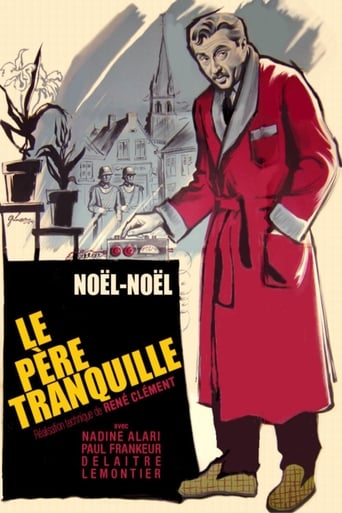didierfort
My summary says all of my point of view. It goes even over the top, for a really excellent piece of propaganda should not be understood as propaganda… But since all the reviewers pointed that this movie, made just at the end of the war, was sugar-coating French supposed general behaviour during the war and German occupation, it's maybe time to speak about the film itself.Though naive, it's a compelling story, extremely well shot and acted. Noël Noël, Paul Frankeur and above all Nadine Alari --I discover this very talented young woman-- are touching and in tune all along the reels.René Clément shows his mastery in the filming, angles, movements and composition.And the last scene before the epilogue, when father and son are meeting again, is an absolute tear-jerker.Have a break, indulge yourself in watching Le Père tranquille. You won't regret those 90 minutes.
dbdumonteil
René Clément began his career with movies which did not really belong to him,with the exception of his first film (about Resistance too:"La Bataille du Rail" ).Although he co-directed "La Belle et la Bête " ,every cine buff knows that the film is thoroughly Jean Cocteau's work;for "Le Père Tranquille" he is credited with being "Réalisateur Technique" which speaks volumes: in fact the real auteur is the star Noel-Noel who wrote the screenplay ."Le Père Tranquille" is looked upon as a bad propaganda movie by lots of young critics today.Time had not come ,in 1946,when the war just came to an end ,to show the dark side of the mirror:it would take 25 years before Marcel Ophuls made his "le Chagrin Et la Pitié" (1971) which showed that all the French people were not heroes;Louis Malle jumped on the bandwagon and released his "Lacombe Lucien" ,the hero of which was a collaborator.Both films met tumultuous reception.Back in 1946,people did need optimism."Le Père Tranquille" is a dated movie,and one should add that Clement's directing is pretty mediocre ,when compared to some of his later works such as "Jeux Interdits" or the highly superior "Les Maudits" ,the follow-up to "Le Père Tranquille ".Those who attacked Clément for his "naive " depiction of his country should be set down with a DVD player and a copy of "Les Maudits" ,where there IS ,in 1947,a collaborationist journalist among the characters.Noel-Noel portrays a stay-at-home.He grows orchids in his greenhouse,he has breakfast in bed with his missus ,he is in the insurance business and does not seem to care for the world outside.But you should not go by appearances.When the German officer (Howard Vernon) questions him about a man who is missing,the dialog is finally witty : NN: He's a bastard! 0:Why? NN:He is a Gaulliste! O:He ain't! He's one of our agents! Another scene is revealing.While the insurance agent's daughter is playing a military march written to celebrate one of Napoleon's victories,the officer wonders at seeing French people's apathy."Wait and see ,the French answers,you do not know them yet,it takes several years!" Like this ? Try these ....."La Bataille du Rail" René Clément 1945"This land is mine" Jean Renoir 1941"Un Ami Viendra Ce Soir "Raymond Bernard 1945 "Jericho" Henri Calef 1945"Le Jour et l' Heure" René Clément 1962 (which in several respects shows the dark side of those days)
kinsayder
Made very shortly after the end of the war, this film, like Clément's "La bataille du rail", is in part a propaganda exercise. The French people, still dealing with the denunciation and punishment of collaborators, needed an image of themselves under the Occupation as united, defiant and courageous. It was also necessary to depict the Resistance as a spontaneous movement of ordinary people, in order to remove any divisive taint of politics (notably communism) that had been associated with it.Comic actor Noël-Noël, who also wrote the screenplay, plays the elderly and apparently innocuous Édouard Martin, an insurance agent with a passion for orchids. The secret he conceals, even from his family, is that he is the head of the regional Resistance cell. While liaising with London and co-ordinating the sabotage of German military depots in the area, he must also deal with a spy in his ranks.Much of the pleasure of this film is the double game that Martin must constantly play to divert suspicion. When his wife interrupts a meeting with two of his Resistance agents as they are discussing the fate of the German spy, he is forced to resort to coded language. "I have decided," he says, "not to renew his life insurance." There are also moments of genuine tension, as when a group of officers arrive to inspect his orchid house. Are they really interested in the flowers, as they claim, or do they suspect that this is where he hides his weapons and documents?Later films, such as Louis Malle's "Lacombe Lucien", would help to provide a more balanced picture of life under the Occupation. But this entertaining film stands as a tribute to the quiet heroism of ordinary people like M. Martin.
elegender
In my opinion the worst movie about a sad era. A propaganda movie for French social and national peace after the second world war. But this is not the truth, I'm French, and I want to the see the true history, like the German people. Sadly enough not all French people were partisans only few of them, and happily not all German people were Nazis. Noel Noel as a scriptwriter and actor is not unbiased. Unfortunately there is a good director (Lust for Evil, Forbidden games...). To me this movie is rubbish. About this era, I would advise people to watch the Louis Malle's movie : Lacombe Lucien, which is much more in keeping with historical truth, sadly French people are only humans.


